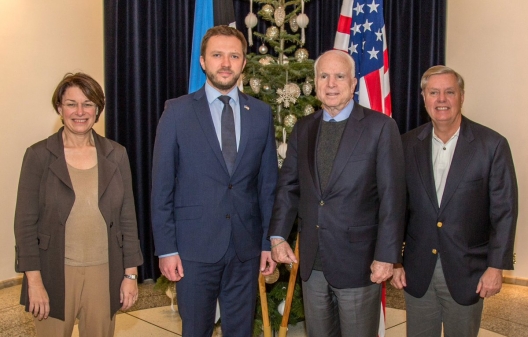 Three American senators arrived in Tallinn, Estonia on Tuesday to reassure the Baltic nations that the United States remained committed to their defense and to the NATO alliance.
Three American senators arrived in Tallinn, Estonia on Tuesday to reassure the Baltic nations that the United States remained committed to their defense and to the NATO alliance.
The visit by the senators — John McCain, Republican of Arizona; Lindsey Graham, Republican of South Carolina; and Amy Klobuchar, Democrat of Minnesota — came as Estonia and other former Soviet republics that are now members of NATO have grown apprehensive over whether President-elect Donald J. Trump will uphold longstanding American commitments to the alliance.
During the presidential campaign, Mr. Trump dismissed NATO as “obsolete” and appeared to set conditions for continued United States participation in the alliance, the cornerstone of trans-Atlantic security since 1947.
“I am convinced and certain that our relations, and the American relationship with NATO, will remain the same,” Mr. McCain said at a news conference with Estonia’s new prime minister, Juri Ratas….
Audronius Azubalis, a Lithuanian lawmaker and former minister of foreign affairs, said in a telephone interview that the senators’ visit “sends a strong message to the Baltic states and those under direct threat — Georgia and Ukraine — that the allies will stand with us” and that the United States would not bow to Russian aggression.
Lithuanians have been alarmed by Mr. Trump’s comments in support of President Vladimir V. Putin of Russia, Mr. Azubalis said, but are now waiting to see if his attitude toward Mr. Putin shifts once he takes office.
“That was the campaign,” Mr. Azubalis said, “now let’s give the president-elect time to show his real intentions.” Should he continue to embrace Mr. Putin, Mr. Azubalis said, “that could be a threat for the world….”
“The worst thing that Trump has done is question the American commitment to NATO deterrence,” said Edward Lucas, a senior vice president at the Center for European Policy Analysis. “Without America, NATO doesn’t work. NATO is basically a force multiplier for America in Europe.”
Jorge Benitez, a scholar at the Atlantic Council in Washington, said that the Baltic countries were looking for “clarity and commitment,” and that the senators were limited in how much assurance they could provide.
“While congressional support for NATO can be reassuring to our allies and may influence some of the new president’s view on our alliance commitments,” he said, “the bottom line is that the decisive power to defend or abandon NATO belongs to President Trump.”
Image: Estonian Defense Minister Margus Tsahkna with senators John McCain, Lindsey Graham, and Amy Klobuchar, Dec. 27, 2016 (photo: Estonian Ministry of Defense)
